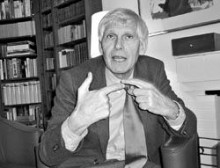A few years ago the OSCE conference in Berlin adopted several key decisions on overcoming anti-Semitism, which is surfacing in some countries and increasing in others. According to international organizations, cases of anti-Semitism also occur in Ukraine.
In Kyiv, representatives of the OSCE, NGOs, and government institutions recently presented a selection of materials on combating anti-Semitism. The presentation coincided with the visit of Gert Weisskirchen, the Personal Representative of the Chairman-in-Office, OSCE, On Combating Anti-Semitism, who often visits Ukraine. This member of the German Bundestag believes that the key to overcoming anti-Semitism is educating and winning over young people.
What are the tendencies with regard to anti-Semitic attitudes and occurrences in Ukraine, and what must Ukraine’s government and the OSCE do to make the specter of anti-Semitism disappear in Ukraine and the rest of the world? These and other questions are raised in The Day’s interview with Gert WEISSKIRCHEN.
You have been to Ukraine many times in connection with your mission. What is your general impression of anti-Semitic attitudes in our country?
“I would say that the tendency is that anti-Semitism still exists. Sometimes rabbis are beaten or Orthodox Jews are humiliated. Graves are often desecrated in Jewish cemeteries. I would say that, unfortunately, your country has certain negative tendencies, and the time has come to counteract anti-Semitism more actively.”
So you perceive alarming tendencies in Ukraine. Is this what you are saying?
“Yes. There are recorded cases of anti-Semitism. Even this morning (Oct. 24, 2008) an attack against Jews was recorded in Odesa. We were informed that in the past year 20 incidents that could be deemed anti-Semitic have been recorded.”
Compared with previous years, is the tendency positive or negative?
“The picture is constant. Anti-Semitic incidents occur in your country, and there is nothing extraordinary in this. When we talk about Germany, every week a Jewish cemetery is desecrated. This is nothing new. But we can definitely say that in Ukraine this tendency is noticeable.”
How different is the situation in Russia from ours? Where are there more cases of anti-Semitism?
“There is not a big difference between Ukraine and Russia. However, I would like to remind you: if you compare Ukraine with Germany, in our country we have constant manifestations of anti-Semitism among our citizens. Approximately 10 percent of the population exhibits anti-Semitic behavior. This is not a new phenomenon in countries that belong to the OSCE.”
You have talked about the 48 obligations that OSCE countries took upon themselves. What obligations has Ukraine assumed?
“Ukraine is participating in the system to monitor anti-Semitism nationwide. In your country, data are collected on incidents that have occurred on its territory. These data are incorporated in the annual Hate Crime Report. Ukraine supports this initiative and is a partner in this undertaking.
“It is a very good sign that Ukraine’s Ministry of Education is ready to sign the memorandum on mutual understanding to distribute these materials to Ukraine’s schools and universities. This will also be a very good step. I hope that the specter of anti-Semitism disappears one day, but today, unfortunately, we often face it. I am sincerely thankful that in our discussions the representatives of Ukraine’s government and NGOs are showing courage and continuing to create and deepen awareness of this problem. Whatever happens to any of us either in the framework of combating racism or as a result of hate crimes against foreigners, we will continue working toward our joint victory.
“Other tools to fight cases of anti-Semitism are also available. One such tool is educational materials.”
For example?
“These materials were prepared by teachers who work in Anne Frank House in Holland. Kyiv’s Holocaust Center placed these materials into the Ukrainian context.”
What do you mean by “Ukrainian context”?
“The existing materials are global. That is why each country needs to put them into its national context. This has been done and now the materials are available. That is to say, they are available in the Ukrainian context. The materials talk about what is going on in Ukraine and what it does better in the fight against anti-Semitism. The problem is obtaining financing for this project so that these materials and educational recommendations for teachers can be sent to all education institutions.”
You said that the materials can be used in schools. What about the adult population?
“OSCE member countries need somehow to create public awareness of this problem. This can be done through the mass media.”
What else can Ukraine do to combat anti-Semitism?
“Continue fighting it and raising awareness of this problem. Anti-Semitism still exists, and we need to do a better job of combating this phenomenon.”
As far as counteracting anti-Semitism in the world is concerned, what tendencies can be observed?
“A constant picture may be observed. All 55 OSCE member states constantly record expressions of anti-Semitism among roughly 10 percent of the population. Sometimes this trend peaks, for example, during the Intifada. This means that all kinds of anti-Semitic activities and their manifestations are mixed up together. Then the intensity fades.”
What can you say about Russia’s attitude to this problem? Are Russian leaders actively combating expressions of anti-Semitism?
“At this stage, the Russian Federation is somewhat passive while Ukraine is pro-active. The difference can be seen in the attitude of the two governments to the problem.”
What more can the OSCE do? Can it get its members to pay more attention to fighting this evil?
“Yes. We offer programs and materials for institutes and schools. In other words, we only supply additional materials. It depends on the member countries whether they will make use of these opportunities.”
So this hinges on their will?
“Precisely. We cannot force them to do this. We only provide ideas, and then the OSCE members decide how to adapt these materials to the needs of their countries.”








